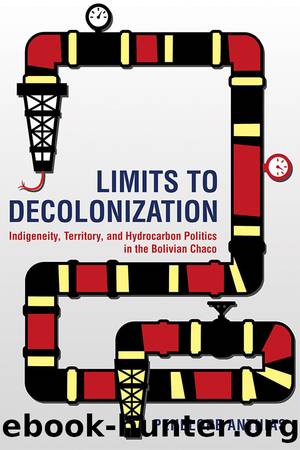Limits to Decolonization by Penelope Anthias

Author:Penelope Anthias [Anthias, Penelope]
Language: eng
Format: epub
ISBN: 9781501714368
Barnesnoble:
Publisher: Cornell University Press
Published: 2018-03-15T00:00:00+00:00
Accounts differ as to the degree of agency the Guaranà exercised in these labor arrangements; some people (such as Armandoâs brother-in-law Hermes) suggested they were entered into voluntarily and not everyone in Tarairà worked for the patrones, while others (including Fausto) claimed that work was âobligatoryâ and patrones exercised âtotal controlâ over their workers. In the context of APG IG efforts to distance themselves from NGOs amidst hydrocarbon negotiations (see chapters 5 and 6), such debates have become highly politicized. By 2011, some APG IG leaders (such as Román) strongly rejected the victimized position constructed by NGO narratives of empatronamiento, insisting that the Guaranà âhave always been autonomousâ and denouncing NGOs as the ânew patrones.â My ethnographic engagements have led me to view empatronamiento as a set of complex and heterogeneous relationships that were not devoid of indigenous agency (see also Killick 2008), but were, in most cases, highly exploitative and culturally degrading. As chapter 1 details, memories of âsufferingâ under empatronamiento give meaning to the recent land struggle for many community members. As Alcides, mburuvicha of the neighboring community of Itikirenda, recounted:
[A karai landowner] took ownership of everything, so then they, our grandfathers, worked as employees, but he didnât pay them. He ordered them around, said what they had to do, so they suffered more than us ⦠and then our captains met, the mburuvicha guasu, those who are highest; they saw that ⦠that we always sufferedâso they said: âEnough! Enough working, enough!â ⦠We started then to work on our own.
As this highlights, empatronamiento marked the GuaranÃâs loss of control over their land and labor, preventing them from producing territory according to their own cultural practices and needs. It is in this context that âreclaiming territoryâ gains meaning for many Guaranà people.
Yet even in the days of empatronamiento, households in Tarairà continued to practice some subsistence farmingâsomething they achieved through a combination of stealth and informal negotiation with the Mendez family (introduced in the previous chapter), whose estate (now partitioned) surrounds the community. According to Armandoâs elderly mother, it was women who took charge of growing maize during this period. If this illustrates Guaranà resilience in the face of racialized dispossession, then the situation was hardly ideal. Not only were many community members forced, whether by coercion or circumstance, to work long hours for no wage far from their homes, but also their community itself was the property of a karai landowner. In this context, it is easy to see why the idea of âreclaiming territoryâ resonated with community members in TarairÃ. As Pablo, the communityâs nurse, put it, âWhen we speak of the TCO, our hope is ⦠to live better, without anyone being able to tell us, âHey, thatâs my land, you have to work for free.âââ
Today, land use practices in Tarairà combine traditional norms with more recent influences. As in the past, household plots remain an important form of informal land tenancy, although, as I will elaborate, not all households have their own plot, owing to the limited land available.
Download
This site does not store any files on its server. We only index and link to content provided by other sites. Please contact the content providers to delete copyright contents if any and email us, we'll remove relevant links or contents immediately.
Cat's cradle by Kurt Vonnegut(15339)
Pimp by Iceberg Slim(14489)
4 3 2 1: A Novel by Paul Auster(12377)
Underground: A Human History of the Worlds Beneath Our Feet by Will Hunt(12090)
The Radium Girls by Kate Moore(12019)
Wiseguy by Nicholas Pileggi(5771)
The Fire Next Time by James Baldwin(5432)
Perfect Rhythm by Jae(5398)
American History Stories, Volume III (Yesterday's Classics) by Pratt Mara L(5301)
Paper Towns by Green John(5181)
Pale Blue Dot by Carl Sagan(4996)
A Higher Loyalty: Truth, Lies, and Leadership by James Comey(4955)
The Mayflower and the Pilgrims' New World by Nathaniel Philbrick(4495)
The Doomsday Machine by Daniel Ellsberg(4485)
Killers of the Flower Moon: The Osage Murders and the Birth of the FBI by David Grann(4443)
The Sympathizer by Viet Thanh Nguyen(4385)
Too Much and Not the Mood by Durga Chew-Bose(4338)
The Borden Murders by Sarah Miller(4315)
Sticky Fingers by Joe Hagan(4189)
